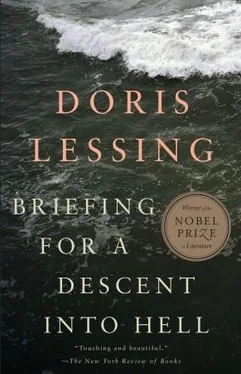I was sickened with loss, with knowledge of an unforseeable callousness on their part. To take them and to leave me? In all our voyagings we had never envisaged that we might simply be lifted up and taken away like a litter of puppies or kittens. We had wanted instructions, or aid, we needed to be told how to get off this endless cycling and into the Southern current. Now that this had not happened, and no instructions or information had been given, only a sort of kidnapping, then I wanted to scream against their coldness and cruelty, as one small kitten that has been hidden by a fold of a blanket in the bottom of a basket mews out in loneliness as it moves blindly about, feeling with its muzzle and its senses for its lost companions among the rapidly chilling folds of the blanket.
I stayed at the deck’s edge. For while the ship needed steering and the sails setting, and for all I knew we had already swung about, I could not handle this ship by myself. I already knew that I must leave her, unless I was to choose to live on board her alone, on the small chance that the Disc would hover down again and discharge my companions in the same way it had taken them off. But I did not think this was likely to happen. And I was afraid to stay.
It was as if that Disc, or Crystal, in its swift passage across or through the ship, across or through me, had changed the atmosphere of the ship, changed me. I was shaking and shivering in a cold dread. I could hardly stand, but leaned clinging to a rope. When the shaking had seemed to stop, and I stood clenching my teeth and waiting for the puppy-warmth of life to come back, then the shaking began again, like a fit of malaria, though this was a sort of weakness, not a fever. Now everything in the ship was inimicable to me, as if the disc’s breath had started a rot in its substance. To say that I had been terrified and was still terrified would be too much of an everyday statement. No, I had been struck with foreignness, I had taken a deep breath of an insupportable air. I was not at all myself, and my new loathing that was so much more than a fear of the ship was in itself an illness. Meanwhile the sails shook and flapped and bellied or hung idle above my head. Meanwhile the ship shuddered and swung to every new shift in the fitfully changing wind. Meanwhile she was a creature that had been assaulted and left to die.
I began making a raft, using timber from the carpenter’s store. I worked feverishly, wanting to get away. It never crossed my mind to stay on her, so strong was my fear. Yet I knew that to set off by myself on a raft was more dangerous than staying. On the ship was water, food, some shelter, until it foundered or crashed on a rock. Until then, it would be my safety. But I could not stay. It was as if my having been ignored, left behind, out of all my old comrades, was in itself a kind of curse. I had been branded with my ship.
I worked for many hours and when daylight went, I lashed a storm lantern to a spar and worked on through the night. I made a raft about twelve by twelve of balsa wood poles. To this I lashed a locker full of rations, and a barrel of water. I fitted a sail on a mast in the middle of the raft. I took three pairs of oars, and lashed two spare pairs securely to the timbers of the raft. In the centre of the raft I made a platform of planks about four feet across. And all this time I worked in a deadly terror, a cold sick fear, attacked intermittently by the fits of shaking so that I had to double up as if in cramp, and hold on to a support for fear I’d shake myself to pieces.
By the dawn my raft was done. The sky reddened in my face as I stood looking forward with the ship’s movement, so I saw that the ship had already swung about and was heading back in the grip of the Guinea Current to the Cameroons or the Congo. I had to leave it as quickly as I could, and trust that I could still row myself out of this deadly shore-going current and back into the Equatorial stream once again. I put on all the clothes I could find. I let the raft fall into the sea, where it floated like a cork. And with all the sky aflame with sunrise like the inside of a ripening peach, I swarmed down a rope and swung myself on to the raft just as it was about to bob right out of my reach. I reached the raft still dry, though already beginning to be well damped by spray, and at once began rowing with my back to the sunrise. I rowed as if I were making towards safety and a good dry ship instead of away from one. By the time the sun stood up in a clear summer-hazy sky three or four handsbreadths from the horizon, our ship’s sails were a low swarm of white, like a cluster of butterflies settled on the waves, and well behind me, and I was heading West on my real right course. And when I turned my head to look again, it was hard to tell whether I was looking at the white of the sails or at foam on a distant swell. For the sea had changed, to my advantage, and was rolling and rocking, and no longer chopping and changing. And so I rowed all that day, and most of that following night. I rowed and rowed and rowed, until my arms seemed separate from myself, they worked on without my knowing I was ordering them to. Then one day — I think it was three days after I last saw the sails of my ship vanishing East — there was a sudden squally afternoon and my clothes got soaked, and I lost my spare oars. And two days after that, a heavy sea dragged my last oars from me and since then I’ve been trusting myself to the current that curves West and North. And now I have all the time in the world to reflect that I am still engaged in the same journey in the same current, round and round and round, with the West Indies my next landfall, and poor Charlie’s Nancy and her song, just as if I had stayed on the ship with my comrades. And after the women’s song, just as before, around and around, past the Sargasso Sea, and around in the Gulf Stream, and around in the swing of the sea past the coasts of Portugal and Spain, and around and around. But now I am not in a tall ship with sails like white butterflies but on a small raft and alone, around and around. And everything is the same, around and around, with only a slight but worsening change in the shape of my hope: will They, or the Disc, or Crystal Thing, on its next descent, be able to see the speck of my raft on the sea? Will they see me and find the kindness to give me a hail or a shout in reply when I ask them, How may I leave this Current? Friends, set me fair for that other coast, I pray you.
Yes, I’ll hail them, of course, though now a new coldness in my heart tells me of a fear I didn’t have before. I had not thought once, not in all those cycles and circles and circuits, around and around, that they might simply not notice me, as a man might not notice a sleeping kitten or a blind puppy hidden under the fold of his smelly blanket. Why should they notice the speck of a raft on the wide sea? Yet there is nothing for it but to go on, oarless, rudderless, sleepless, exhausted. After all I know it would be a kindness to land on Nancy’s coast and tell her that her Charlie has met up at last with — what? Them, I suppose, though that is all I can tell her, not even how he felt as he became absorbed into the substance of that shining Thing. Will she sing her song to me on my raft, drifting past, will the women line up along the walls of their summer gardens and sing, and shall I then sing back how the time is past for love? And then on I’ll drift to George’s friend and shout to him how George has — what? And where? And then on and on and on, until I see again my Conchita waiting, dressed in the habit of a nun, where all my wandering and sailing has put her.
Man like a great tree
Resents storms.
Arms, knees, hands,
Too stiff for love,
As a tree resists wind.
But slowly wakes,
And in the dark wood
Читать дальше
Конец ознакомительного отрывка
Купить книгу










